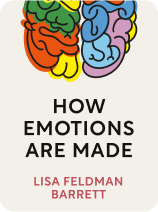

This article is an excerpt from the Shortform book guide to "How Emotions Are Made" by Lisa Feldman Barrett. Shortform has the world's best summaries and analyses of books you should be reading.
Like this article? Sign up for a free trial here.
What is Lisa Feldman Barrett’s body budget? How do you know if your body budget is imbalanced?
In her book, How Emotions Are Made, author Lisa Feldman Barrett introduces the body budgeting concept as the way you regulate energy and emotions. According to Barrett, maintaining a balanced body budget is important for your overall sense of wellbeing.
Keep reading to learn more about your body budget, according to Lisa Feldman Barrett.
What Is Your Body Budget, According to Science?
In interoception, your brain gets sensory input from inside your body, including information about your heart rate, breathing, blood pressure, temperature, hormones, metabolism, and so on. Then, in a process that Lisa Feldman Barrett dubs “body budgeting,” your brain makes predictions about what those internal sensations mean in terms of your body’s energy needs, and it regulates the body accordingly—by doing things such as speeding up your heart, slowing down breathing, releasing more cortisol, or metabolizing more glucose.
How Body Budget and Emotions Are Connected
Your infant brain compresses the sensory input it receives, creating similarities out of differences to make concepts. It takes all of your past experiences with a particular emotion and categorizes them into emotion concepts such as “joy,” “excitement,” or “despair.” Once you’ve learned these concepts, your brain can run this process in reverse, expanding the similarities into differences to do what Lisa Feldman Barrett calls “constructing an instance of a concept,” also known as predicting. All concepts that your brain makes are ways of regulating your body.
For example, say you have a gnawing in the pit of your stomach (internal sensory input), which your brain reads simply as “unpleasant and agitated” (interoception). You’re sitting in an antiseptic-smelling hospital, listening to nurses’ shoes scuffing the floor, and you’re about to undergo a medical procedure (external sensory input).
Although you’ve never undergone this particular medical procedure, and you understand it to be quite simple and safe, you learned many years ago that feelings like this, in an environment such as this, mean “fear” (emotion concept). Based on all those past experiences with fear, your brain predicts that in this particular instance, you are having an experience of fear (emotion). This allows the brain to predict what the body will need to cope with this fear. This prediction causes your brain to release cortisol, which gives you a burst of energy; it also causes you to stand up and pace the hallway in an attempt to calm your nerves (body budgeting).
Your brain explains the gnawing in the pit of your stomach as “fear,” and it adjusts your body budget and your actions accordingly. All of this happens instantaneously.
| Exercise, Sleep, and the Brain The connection between exercise, sleep, and brain function is well-established. For example, in Brain Rules, developmental molecular biologist John Medina explains that exercise improves cognition and other essential brain functions by increasing blood flow to the brain. Oxygen-rich blood helps neurons stay young and operational, and it also removes toxins from the blood. Sleep is also crucial for healthy brain functioning. The science is clear that exercise and sleep have a positive impact on both the brain and the body. Lisa Feldman Barrett adds to this science by demonstrating how your body budget—summarized by your simple internal sensations of pleasure, displeasure, calmness, and agitation—forms the building blocks for your emotions, such that sleep, exercise, and other activities that help balance your body budget increase your emotional well-being. |
Is Your Body Budget Imbalanced?
How you feel inside has a huge impact on your emotions. A “bad” feeling doesn’t necessarily mean something is wrong; it can just mean that you’re overloading your body budget—your inner physical state. A balanced body budget is necessary for a healthy emotional life.
Lisa Feldman Barrett argues that many aspects of modern culture are designed to throw off your body budget: processed food with lots of sugar and bad fats, schools and jobs that require you to get up early and go to bed late, and people expecting you to be available via cellphone at all hours. All of these things can make you feel bad, which in turn can make you self-medicate. (Shortform note: Too much sugar in your diet, common in modern culture, is now being linked to increased risk for depression.)
How to Maintain a Balanced Body Budget
To keep your body budget balanced, Lisa Feldman Barrett prescribes eating healthy foods, exercising or simply moving your body, and getting enough sleep. All animals, including humans, use motion to balance their body budget. Activities such as yoga or massage can also make you feel more comfortable.
Your physical surroundings affect your body budget, too, so Lisa Feldman Barrett says that one way to balance it is to spend less time in noisy, crowded spaces, and more time in places with greenery and natural light. Changing your location or situation in other ways can also help. (Shortform note: The American Psychological Association says that short-term benefits of spending time in nature include a reduction in stress and improved cognitive ability. They claim that even being exposed to nature sounds, such as birds chirping, produces these effects.)
Interacting with people you’re close to can also help you regulate your body budget. Without realizing it, you and your friends, family, and other loved ones synchronize your breathing and heart beats each time you talk or spend time together. (Shortform note: A 2019 study determined that the quality of a person’s social circle (based on cellphone activity) was a better indicator of stress levels than was data from their fitness trackers.)
In fact, communicating emotions itself helps people balance each other’s body budgets. This can even happen over the phone, by email, or just by thinking about someone.

———End of Preview———
Like what you just read? Read the rest of the world's best book summary and analysis of Lisa Feldman Barrett's "How Emotions Are Made" at Shortform.
Here's what you'll find in our full How Emotions Are Made summary:
- A deep dive into what emotions really are and where they come from
- How some cultures have different emotions than others
- The difference between feelings and emotions






